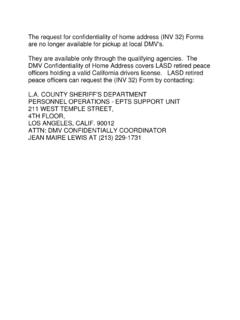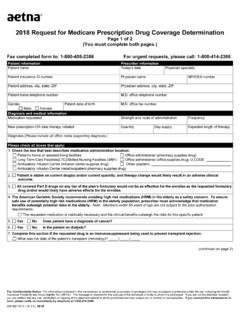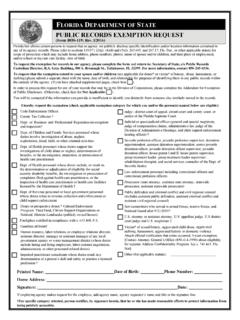Transcription of Confidentiality - IFAPA
1 Confidentiality :A Guide forFoster Parents3 Table of ContentsIntroduction4 Summary of Iowa s Confidentiality Laws5 Civil and criminal penalties5 Confidentiality Best Practices7 Seeking consent (permission)7 Releasing information8 Attaining information14 Situations15 When accepting a new placement15 When dealing with the biological family17 Schools18 Medical treatment and emergencies20 HIV/AIDS22 Dealing with provider agencies, therapists23 Support groups/talking to other foster parents24 Liaisons25 Foster parent treatment logs26 Respite care27 Media28 Court and legal systems29 Court Appointed Special Advocates and Foster Care Review Board30 Community31 Adoption32 When the child is moved from the foster home32 Child abuse reports and allegations of child abuse33 Information about the foster home34 Foster Parents Rights36 Penalties for Breaching Confidentiality37 Signatures and Consents, Liability Issues38 Appendix39 Iowa code39 Definition of implied consent45 Designated legal guardians45 Introduction4 IntroductionUnderstanding and upholding Iowa s Confidentiality laws is one of the mostcomplex issues with which foster parents laws are intended to protect the privacy of foster children and theirbiological families, and in turn, create a relationship for foster families,biological families, foster children, and other involved individuals that is basedon trust and purpose of this guide is to.
2 Explain and clarify Confidentiality laws pertaining to foster parents educate foster parents and others address different types of situations that commonly arise in fostercare establish and encourage best practicesSummary5 Summary of Iowa sConfidentiality LawsSubmitted by the Attorney General s OfficeGenerally, any document or piece of information possessed by stategovernment, its employees or anyone acting on behalf of the state, is is available on request, by anybody, for any reason, or no reason. However,there are certain documents and information contained within those documentswhich is confidential by statute or administrative rule. If the document isconfidential, so is the information from the document. Prior to any release ofa document or disclosure of information, the statutes and rules must statutes generally make confidential any documents and informationconcerning foster children.
3 But usually, documents and information aboutfoster care licensing status is not a statute makes the identity of an individual confidential, then any informationwith which the person could be identified is confidential. This individuallyidentifiable information consists of the clues which, if put together, wouldidentify only one person; for example, the red-haired 8th grader who lives withhis divorced mother and 4th grade sister on the cul-de-sac on the north edgeof if release of a document or information is allowed, release to somebodyelse, sometimes called redissemination, may be prohibited. The statute orrules must be checked before releasing to and Criminal PenaltiesViolation of these rules may be punished both civilly and criminally. Theperson(s) whose documents or information or identity was released illegally,may file a civil lawsuit for money against the person(s) who released it.
4 TheCounty Attorney may file criminal charges seeking a fine of $50 to $1500 andimprisonment in the county jail for up to 1 addition, if the person(s) who released the information is a licensee of thestate (foster parent) the license can be revoked, and licenses may not beissued in the Practices7 Confidentiality Best Practices Best practices can be used by foster parents as a guide to acting within theboundaries of Confidentiality law in Iowa. Because fact circumstances maychange, if you are in doubt, check with your DHS worker and/or your Consent (Permission)Only the legal guardian has the authority to consent to routine medicalcare, participation in school activities, extra-curricular activities, obtaining adriver s permit, and out-of-state travel for the child. The custodian may onlyauthorize emergency medical care. This authority is not transferred to thefoster parent(s) or the child s social worker.
5 There is no such thing as impliedconsent or acquiescence by silence when acting on behalf of foster the appendix for a definition of implied children in foster care, the legal guardian may or adoptive parentsWhile DHS has legal custody of the child, the biological or adoptiveparents usually retain legal Department of Human ServicesIf termination of parental rights occurs, the Department of HumanServices is usually designated as the legal guardian. For signaturepurposes, a person will be designated to sign consents and givepermission on behalf of DHS. This person is never your child scase manager. If you need a guardian s signature, ask the DHScase manager to obtain it for personsOther persons may be extended family members who retainguardianship due to special is always best to have written, rather than verbal,consent from the legal guardian. In most instances, onlywritten consent will be Practices8In some instances, written consent may not be these cases, your options are: If the legal guardian gives verbal consent, note the conversationand the guardian s consent in your foster parent log.
6 Be sure toinclude date and time of day. If there is a need for emergency medical treatment and the legalguardian is not available, the legal custodian (DHS) may giveconsent, an emergency ex-parte order can be obtained from thecourt, or doctors may provide care without consent if the emergencyis InformationAll information regarding foster children which is obtained through or from theDepartment of Human Services is confidential, according to Iowa Code. Thisincludes: Identifying information - name, social security number, age, sex,height, weight, etc. Religious and cultural preferences Contact information - current address, permanent address, phonenumber, e-mail address, etc. Physical and mental health conditions Family information Legal statusFoster parents must receive written consent from the legalguardian in order to release information concerning thechild. Usually, DHS will be responsible to obtain not redisseminate (release) information that othershave given to you, for example, the child s full name anddate of birth, contact information regarding the child s parent or guardian, anywritten reports, information regarding the child s previous placementexperiences and behaviors, health information, school information, Practices9 You may release information that you gain from yourinteractions with the You notice that your foster child is having problem with mathhomework.
7 You may discuss the situation with the child s Your foster child confides in you about a previous incidence ofabuse. You must report the alleged abuse to DHS on the Department of Human Services to releasethe child s reports and relevant information to theappropriate good rules to remember:1. Do not share information with anyone else unlessspecifically some circumstances, information may be released ona need-to-know basis. Need-to-know is defined as theextent that it is necessary to provide adequate services to the child in fostercare. Need-to-know is a subjective measurement. It differs from person toperson and situation to situation. If you have any questions regarding need-to-know, ask your foster care need-to-know exception to the law is difficult and can be defined differentlyby different individuals. The following protocol can help you define the need-to-know. In determining the need-to-know, ask yourself the following questions:Q1:Who is asking for the information?
8 This is perhaps the most importantquestion to answer, because the state only allows foster parents torelease information with specific authorization from the legal guardian,even on a need-to-know basis, to certain following may be legal guardians of the child and are entitledto information about the child:2. Do not identify the child as a foster Practices10 the biological parent(s) or adoptive parent(s) the Iowa Department of Human Services other court appointed guardian(s) Iowa Department of Human Services is the legal custodianof children placed in foster care and is entitled to informationabout those following have a professional relationship with the child andmay have the need to obtain information about the child: the child s foster care worker(s) a physician or mental health practitioner (this includes mid-levels, such as physician assistants and nurse practitioners) the child s attorney/guardian ad litem/Court Appointed SpecialAdvocate (CASA)/other attorneys that have standing in thecase.
9 The court an agency providing services to the child or family the Foster Care Review Board (FCRB) following individuals may have a close personal or professionalrelationship with the child, the biological family, or with youpersonally, but do NOT have the right to obtain information fromfoster parents, unless there is a release of information: extended members of the foster family extended members of the biological or adoptive family teachers, coaches, and other school officials clergy members of the community support group members law enforcement officersAgain, if you have any questions about sharing information, ask your fostercare Practices11Q2:Does the individual requesting the information fall under a categoryauthorized by the state to receive information on a need-to-know basis?A2:If the individual requesting the information falls under categories A,B, or C (previous page) you are allowed to disclose certaininformation without the parent s or guardian s specific the individual is not listed in category A, B, or C, you cannotshare information with :How will they use the information?
10 A3:The situation greatly affects how much information you shoulddisclose. You should release only the information the person needsin order to provide adequate the following scenarios:Situation #1 - First visit with the child to a :Who is asking for the information?A1:A psychiatristQ2:Does the individual requesting the information fall under a categoryauthorized by the state to receive information on a need-to-knowbasis?A2:Yes, the psychiatrist falls under category C - has aprofessional relationship with the child and is approved bystate law to receive information on a need-to-know :How will they use the information?A3:A psychiatrist may need to know a detailed history of thechild s life in order to come to an understanding the child sbehavior and make an accurate diagnosis. This informationBest Practices12may include any known history of abuse, the number ofplacements in foster care, previously diagnosed behaviordisorders, medical condition(s), personal relationships, #2 - A visit to the doctor because the child has a bad :Who is asking for the information?














